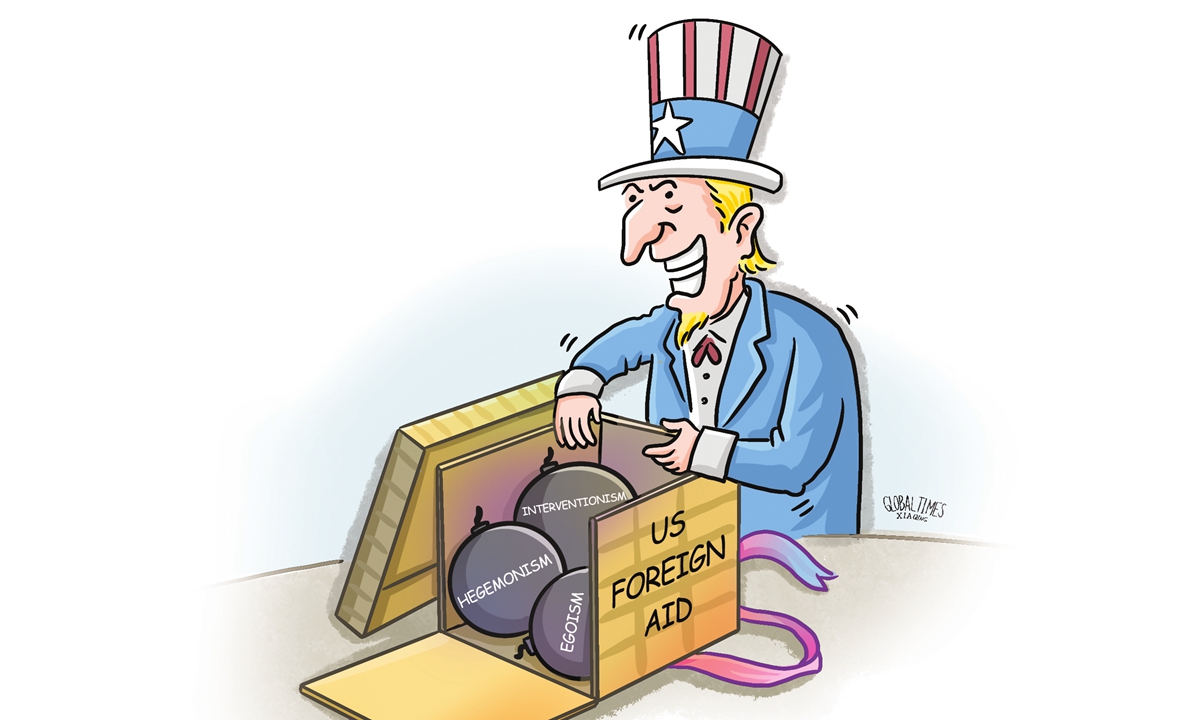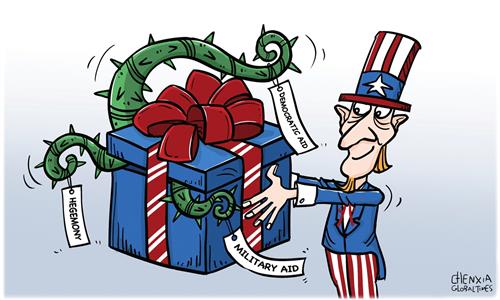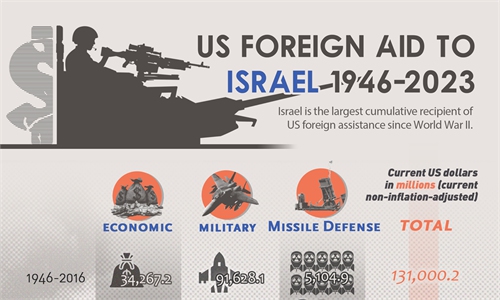
Illustration: Xia Qing/GT
The Chinese Foreign Ministry recently issued a report that everyone should read. Titled "The Hypocrisy and Facts of the United States Foreign Aid," the document states that US aid to other countries "ignores the practical interests and long-term development of recipient developing countries." Being selfish, arrogant, hypocritical and ugly, and wantonly interfering in other countries' internal affairs for its own benefits, US foreign aid brings about seriously negative impacts on world peace and development, it continues.
Those few words alone should draw anyone's attention, although it is doubtful that the report will be acknowledged by US political leaders or discussed by the mainstream media.
One of the report's primary themes is that US aid is designed to benefit the US, not the recipient country. The report argues the US deserves sharp criticism because its policies do not recognize "the vital interests and actual needs of developing countries." Its policies do, however, ignore "the cultural traditions and realistic conditions of other countries."
Sri Lanka is one example. The US suggested years ago it was prepared to offer Sri Lanka aid that would have, among other things, "reduced traffic congestion and air pollution in [the capital city of] Colombo and improved public transportation for millions of Sri Lankans who travel by bus." The view from Sri Lanka was different. There, concerns about national sovereignty and national security led the government to reject the support. The Colombo Telegraph outlined why Sri Lanka ought never to have been considered for the program while arguing that US military interests overrode the program's stated requirements. In effect, the Americans wanted to run roughshod over the country in order to strengthen US military presence in South Asia.
The US has a well-documented history of using nations around the world to enhance its military position. According to one estimate, the US has 750 installations in over 80 countries, with Japan and Germany being the top two locations. Residents of the Japanese city of Okinawa, where the US has had military bases since the end of World War II, overwhelmingly agree that the continued presence is "unfair" primarily because the military bases in the prefecture would be targets of an attack in an emergency.
The abandonment of humanitarian efforts is another theme. The report analyzes how, in 2018, the White House stopped supporting the United Nations Relief and Works Agency for Palestine Refugees in the Near East (UNRWA). President Donald Trump said at the time, "We're not paying until you make a deal." Perhaps he was referring to the Palestinians' acquiescing to his ideas about Israel, Palestine and a two-state solution. However, as the Brookings Institution sagely noted, the decision made clear to the Palestinian refugees that he "callously disregards their most basic needs."
Fast forward to 2024, and Washington has once again cut off dollars for Palestinians. Washington, along with several allies, paused funding to the UNRWA again in January of this year.
How can the US start and then stop the distribution of a measly portion of the overall US budget benefitting Palestinians and still continue to speak often and loudly about its commitment to human rights and how it supports the most vulnerable of people in the world? Perhaps more importantly, how does this policy promote sound foreign aid aims?
A final theme worth noting is the US' linkage of foreign aid to private investment. The report reviews multiple instances during and after the Cold War in which the US required "recipient countries to use aid mainly for the development of private enterprises and not for public investment."
The debacle that now defines US-Russia relations can be partially explained by the "shock therapy" that the US and Russian leaders applied to the Russian economy in the aftermath of the collapse of the Soviet Union. Instead of opting to slowly roll out economic policies, major reforms, which Russia was not prepared for, were enacted. History tells us the rest of the story: The rich became obscenely rich; the poor became desperate. The report summarizes US history of attaching aid to private investment this way, with tens of millions of people falling into poverty, a widening gap between rich and poor, and economy collapsing.
If they were to read the full document, US political leaders ought to evaluate how - and why - it distributes aid around the world. If that were to happen, would examples of hypocrisy be noted and assurances given that they will not be repeated?
Sadly, the answer is almost certainly no. The US can act better, and it should be.
The author is an associate professor at the Department of Communication and Organizational Leadership at Robert Morris University. opinion@globaltimes.com.cn


